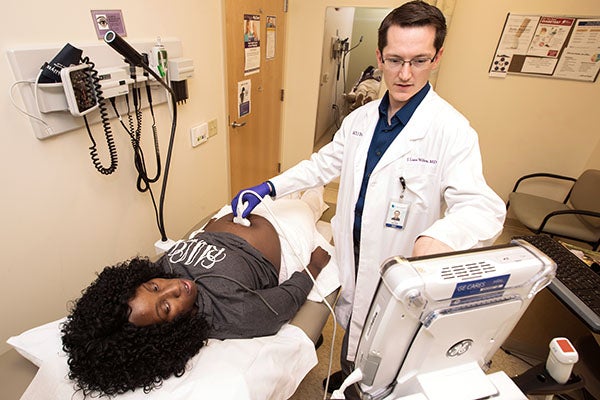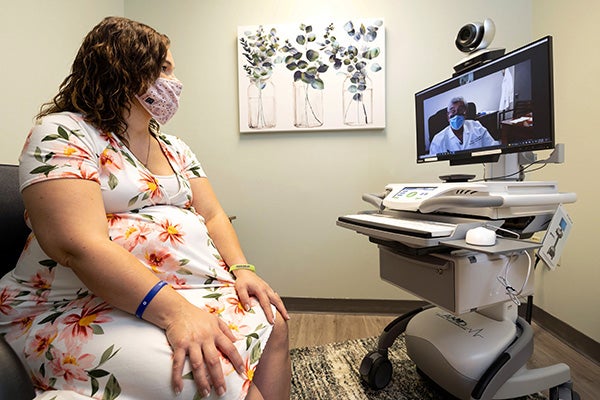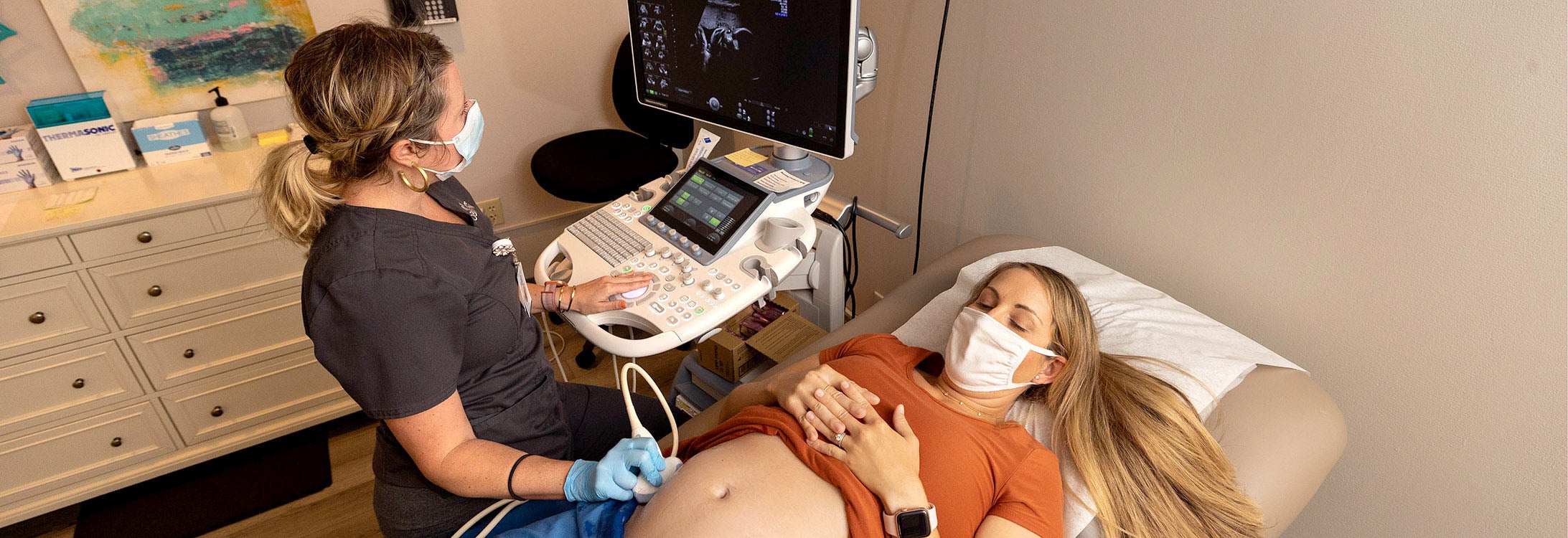RURAL PATIENT CARE
ECU Health, Brody School of Medicine innovate to solve maternal health challenges
ECU Health serves a vast rural region made up of 29 counties and is home to more than 1.4 million people.
Like many rural regions, people across eastern North Carolina face systemic socioeconomic challenges which have negative impacts on health outcomes. Perhaps most tragic of all, the region has wrestled for years with higher infant death rates than the state average, driven by difficult socioeconomic circumstances, barriers in access to care, and fewer local resources to support expecting mothers.
Dr. Madhu Parmar, an OB-GYN for ECU Health, practices in Ahoskie. She helps facilitate countless healthy deliveries, but the ones that don’t go as planned stick with her the most. That is because many of the complications are preventable, and adequate access to perinatal care helps facilitate positive outcomes for both mother and baby. The unfortunate reality is that women and infants in rural and underserved communities simply lack access to the perinatal care they need.

Dr. J. Lane Wilson monitors the health and activity of patient Brandy Wiggins’ baby while performing an ultrasound at the Department of Family Medicine at the Brody School of Medicine.
“This issue is very personal because I feel like there are not enough resources, people and attention placed on caring for mothers and babies in rural areas,” Parmar said. “Rural mothers and babies are the ones that need care the most and we must do all we can to ensure they have access to that care. You hear about smaller hospitals closing down their OB units and that just increases the risk to mother and baby. If a community has access to these services, you see how the mother and the baby can thrive. That’s what we’re aiming for at ECU Health, access for all.”
Parmar said the primary challenges she sees in her patients stem from poverty. Data tells us that one in four mothers in eastern North Carolina live below the poverty line and one in eight are uninsured.
“Because of poverty, patients are not as healthy,” she said. “Obesity and chronic diseases, such as diabetes and hypertension, are the things presenting difficult challenges for normal patients, and those conditions are even more challenging for pregnant patients. The reality is that we take care of a lot of high-risk patients in the East because many of our patients experience poverty.”
Across the region, more than 50 percent of the mothers delivering babies at ECU Health hospitals are clinically overweight. In Ahoskie, where Parmar practices, the average body mass index (BMI) is about 40, nearly 15 points higher than the high range of a healthy person.
Keeping patients informed and educated about their health has been a key focus, Parmar said. Understanding illnesses and what to watch for is half the battle; a healthy mom often leads to a healthier pregnancy.
“A nurse who specializes in diabetes care comes to our office once a week to educate our patients,” Parmar said. “She teaches them how to monitor their blood sugar and how to improve their diet so that we have optimal outcomes for the babies. She works with our nurses, too, and makes sure they’re looking through patients’ blood sugar diaries when they come in. The biggest thing we can do is be available to these patients.”
Women’s care close to home
At a time when many rural communities across the United States are losing access to obstetrics and women’s care services, ECU Health is doing its part to maintain and enhance obstetrics offerings in hospitals across the region.

Stephanie Massey visits Carteret Ob-Gyn for a telemedicine call with Dr. Alan Sacks, a maternal fetal medicine specialist at ECU Health.
According to the Sheps Center for Health Services Research, 183 rural hospitals across the U.S. have completely shuttered operations since 2005. When a hospital closes in a rural community, it makes it difficult for that community to thrive. One of the initial signs of trouble for an ailing rural hospital is a reduction or elimination of labor and delivery services.
Women’s services closures are often driven by the sustainability of the service itself. Staffing an around-the-clock unit is difficult due to the shortage of health care workers. The absence of nearby maternity services results in longer travel times, higher costs and medical complications.
In 2019, an average of 47 babies were born per day across the 29 eastern North Carolina counties. Those babies represent the future of the communities in which they are born and live, signifying the importance of maintaining hospital-based obstetrics and labor and delivery services.
Dr. Daniel Dwyer, an OB-GYN at Outer Banks Women’s Care, said he remembers a time when many mothers in the area used to deliver babies on the way to the hospital. He said having rural hospitals close to where patients are can make the difference for positive outcomes, especially for mothers and babies.
For those living in communities where specialist care may not necessarily be only a few miles away, it is important to find ways to bring services directly to them. At the Outer Banks Women’s Care clinic, Dwyer said the services they offer keep patients close to home while receiving leading-edge care.
“We have begun to see patients for perinatology consultations, which is an important part of coordinating care for our highest risk patients.” Dwyer said. “Historically, it would take more than a half day for patients to get a consultation with a maternal-fetal specialist. In addition to the travel, the setting and staff would be unfamiliar for the patient. There is increased anxiety, cost and potential for loss of key information when patients travel for services that can be delivered in their trusted medical home. We hope to continue to leverage the technology and professional relationships to provide specialist care in rural settings. I think this is but one large step in the right direction toward reducing the disparities in access to the highest quality of care for our patients.”
Supporting hospitals across the region
High-quality perinatal care and labor and delivery services are synonymous with the ECU Health name. Dr. James deVente, associate professor at the East Carolina University Brody School of Medicine and medical director of obstetrics at ECU Health Medical Center, and Angela Still, senior administrator for women’s services at ECU Health Medical Center, have helped lead a perinatal outreach team that takes high quality training and best practices into other hospitals across the region, including facilities not affiliated with ECU Health.
Since 2012, the outreach team has visited every hospital across the region and has helped smaller hospitals better prepare for expectant mothers and new babies with serious medical conditions. From 2018-21 alone, the perinatal outreach team visited 18 different hospitals across the region, hosting 169 simulation days and educating more than 500 students on advanced life support training, emergency simulations, electronic fetal monitoring and more.
According to deVente, these efforts are a necessary part of improving care, reducing infant mortality and helping eastern North Carolina thrive.
“Data shows us that when a woman has to travel more than 50 miles to a hospital, her outcomes are worse. Data also shows us that businesses want to come to communities where labor and delivery services are present,” deVente said. “At ECU Health, we designed the outreach program and cover the cost of this work with those realities in-mind. If we are going to solve the infant mortality issues that our region faces, we are going to have to work together with health care partners across the East. I’m proud to say we are leading the way in that regard and the work is truly making a difference.”
Innovations to bridge gaps
It is no secret that eastern North Carolina is a vast rural region with long travel times between communities. An innovative program launched in 2020 at ECU is helping to make women’s telemedicine, telepsychiatry and nutritional support services more accessible.
The MOTHeRs Project — which stands for Maternal Outreach Through Telehealth for Rural Sites — was first offered to patients at primary care obstetric clinics in Carteret County and has since expanded to ECU Health and other clinics in counties across the region. Through formalized partnerships with clinics, patients in the practices are cared for by both an ECU specialist and their local physician through a combination of telehealth and face-to-face visits.
Dwyer and Outer Banks Women’s Care were the third clinic in the ECU Health system to join the MOTHeRs Project. Maternal-fetal medicine and behavioral health care offerings for expectant mothers has been a much needed addition to the practice.
“We have identified access to mental health care as the greatest need in our rural communities. This need is increased during pregnancy and the post-partum period. Providing this service is a huge addition to maternal health care,” Dwyer said. “We have already begun to have mental health appointments in our office through the MOTHeRs Project. The feedback from our patients have all been very positive. This is just the beginning of learning how to give the needed specialized care in rural offices.”
Through its ongoing work, the MOTHeRS Project expects not only to provide care to those who need it, but also to generate new knowledge regarding how barriers to care can be better addressed. It aims to be a national model to ensure that every woman in rural America has a safe and healthy pregnancy and delivery.
“ECU Health, Brody and East Carolina University are truly pioneering high-quality rural obstetrics and women’s care services,” said Dr. Michael Waldrum, ECU Health CEO and dean of Brody. “Our hospitals and clinics provide excellent care in communities across eastern North Carolina. The perinatal outreach team trains other smaller hospitals on emergency care, best practices and more. Telemedicine innovations like the MOTHeRs Project makes patient-centered care more accessible. I’m proud of the work that all team members do to help our mothers, babies and communities thrive.”
